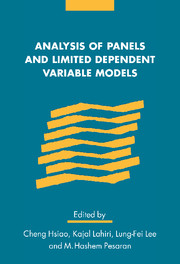Book contents
- Frontmatter
- Contents
- List of contributors
- Foreword
- Introduction
- 1 A note on left censoring
- 2 Autoregressive models with sample selectivity for panel data
- 3 Mixture of normals probit models
- 4 Estimation of dynamic limited-dependent rational expectations models
- 5 A Monte Carlo study of EC estimation in panel data models with limited dependent variables and heterogeneity
- 6 Properties of alternative estimators of dynamic panel models: an empirical analysis of cross-country data for the study of economic growth
- 7 Modified generalized instrumental variables estimation of panel data models with strictly exogenous instrumental variables
- 8 Expectations of expansions for estimators in a dynamic panel data model: some results for weakly exogenous regressors
- 9 Re-examining the rational expectations hypothesis using panel data on multi-period forecasts
- 10 Prediction from the regression model with one-way error components
- 11 Bayes estimation of short-run coefficients in dynamic panel data models
- 12 Bias reduction in estimating long-run relationships from dynamic heterogeneous panels
- CV of G.S. Maddala
- Index
11 - Bayes estimation of short-run coefficients in dynamic panel data models
Published online by Cambridge University Press: 22 September 2009
- Frontmatter
- Contents
- List of contributors
- Foreword
- Introduction
- 1 A note on left censoring
- 2 Autoregressive models with sample selectivity for panel data
- 3 Mixture of normals probit models
- 4 Estimation of dynamic limited-dependent rational expectations models
- 5 A Monte Carlo study of EC estimation in panel data models with limited dependent variables and heterogeneity
- 6 Properties of alternative estimators of dynamic panel models: an empirical analysis of cross-country data for the study of economic growth
- 7 Modified generalized instrumental variables estimation of panel data models with strictly exogenous instrumental variables
- 8 Expectations of expansions for estimators in a dynamic panel data model: some results for weakly exogenous regressors
- 9 Re-examining the rational expectations hypothesis using panel data on multi-period forecasts
- 10 Prediction from the regression model with one-way error components
- 11 Bayes estimation of short-run coefficients in dynamic panel data models
- 12 Bias reduction in estimating long-run relationships from dynamic heterogeneous panels
- CV of G.S. Maddala
- Index
Summary
Introduction
This chapter considers the estimation of the mean coefficients of dynamic panel data models in the presence of coefficient heterogeneity across cross-sectional units. It is well known that when the regressors are exogenous, the estimators based on the sampling approach such as fixed and random effects yield consistent estimates of the mean coefficients when the number of cross-sectional units approaches infinity (see, for example, Zellner (1969)). However, Pesaran and Smith (1995) have demonstrated that the same results do not carry over to dynamic models. The neglect of coefficient heterogeneity in dynamic models creates correlation between the regressors and the error term as well as causing serially correlated disturbances, thus rendering the within estimators biased. Moreover, the bias of the within estimators does not disappear even asymptotically. Neither do the usual remedies such as instrumental variables estimation technique or differencing the variables work in this case. The asymptotic bias of the usual within estimator is a function of the degree of coefficient heterogeneity and the extent of serial correlation in the regressors.
While the inconsistency of traditional pooled panel estimators have been well established for dynamic random coefficient models, it is hard to say that there is similar clarity in the literature about the appropriate estimation technique that needs to be used (see Maddala et al. (1997) for a review).
- Type
- Chapter
- Information
- Analysis of Panels and Limited Dependent Variable Models , pp. 268 - 296Publisher: Cambridge University PressPrint publication year: 1999
- 77
- Cited by



